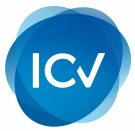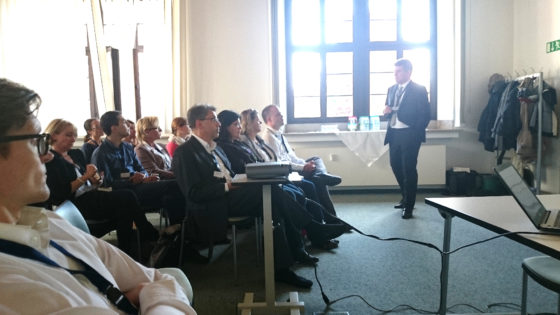
The Hackett Group Benchmarks gelten seit Jahrzehnten als Referenzparameter für global aktive Unternehmen im Bereich Performance der Geschäftsbereiche. “World Class-Performance” hieß die Vorgabe bislang. Um den derzeitigen Entwicklungen und Auswirkungen der digitalen Transformation Rechnung zu tragen, hat die Hackett Group die Messlatte auf einen neuen Level gehoben: Den Digital World-Class Finance Standard. Eine aktuelle Hackett Studie informiert, wie der neue Standard erreicht werden kann und welche Vorteile erzielt werden können. Dazu wurden rund 200 internationale Großunternehmen mit über einer Milliarde US-Dollar Umsatz meist via Benchmarking, aber auch in Projekten untersucht ̶ der Anteil europäischer Unternehmen liegt bei rund 40 Prozent, darunter führende DAX- und MDAX-Unternehmen.
Georg Bach (Bild), MD Central Europe beim ICV Firmenmitglied The Hackett Group, fasst die Ergebnisse der Studie zusammen:
Mehrwert durch Cloud, RPA und Smart Analytics
Die Ergebnisse der Hackett-Studie zeigen: Digitalisierungsmaßnahmen erhöhen die Effizienz und Effektivität von Finanzorganisationen signifikant. Durch den Einsatz von Technologien wie Cloud oder RPA sind – in Abhängigkeit zur Ausgangssituation – Effizienzsteigerungen von mehr als 40 Prozent möglich.
Die Analyse ergab zudem, dass die digitalisierten Unternehmen mit 47 Prozent weniger Vollzeitangestellten (FTE) auskommen. Dennoch investieren sie doppelt so viel Zeit in Business Analyse und werden insgesamt als agiler wahrgenommen. Außerdem: Dadurch, dass die „Digital World Class“ Unternehmen auf moderne Plattformen, Systeme und Tools setzen, geben sie im Durchschnitt bis zu 19 Prozent weniger für Technologie aus, als die Vergleichsgruppe.
Digital World Class Organisationen erzielen zudem einen deutlich höheren Mehrwert für das Unternehmen, indem sie die kontinuierlich steigenden Business Anforderungen besser meistern. So werden zum Beispiel zunehmende Reporting-Anforderungen in Bezug auf Non-Finance KPIs durch den Einsatz von modernen AI basierten Analytics Anwendungen oder „realtime“ Reporting Tools viel effektiver unterstützt.
„Digital World Class“ in drei Phasen
Der erste Schritt: Der CFO definiert mit seinem Team im Rahmen eines Performance Baselinings und einem externen Benchmark mit Digital World Class Unternehmen, wo er heute in Hinblick auf operative Exzellenz steht und welchen aktuellen Business-Value seine Organisation generiert.
Das externe Benchmark sollte zugleich eine Performance-Extrapolation über die bevorstehenden 3-5 Jahre in Hinblick auf zukünftig erwartbare Effizienzsteigerungen und die Berücksichtigung zukünftiger Business Anforderungen, etwa im Rahmen der Umsetzung einer Nachhaltig-keitsstrategie, ermöglichen.
Anschließend ist zu prüfen, inwieweit das aktuelle Technologiesetup, die damit einhergehenden Funktionalitäten, und die gegenwärtig geplanten Projekte die Digitalisierungsstrategie unterstützen. Technologie ist in diesem Zusammenhang nicht der einzige, aber der wesentliche Treiber, um das entsprechende Performance-Level zu erzielen. Eine Gap-Analyse und Empfehlungen aus dem Digital World Class Performance Benchmark liefern dazu wichtige Anhaltspunkte.
Flankierend sind in einem dritten Schritt die funktionalen Rahmenbedingungen zu optimieren. Das Operating Model ist neu auszurichten mit Fokus auf die Standardisierung der Abläufe (zur Absicherung von Automatisierungs- und/oder Cloud-Voraussetzungen), End-to-End Process Ownership, Data Governance oder die (übergreifende) Integration der Prozesse bei Planung und Forecasting.
Die Studie der Hackett Group sieht eine cloud-orientierte Neuausrichtung der eingesetzten Systeme und Tools als wichtige Digitalisierungsmaßnahme an. Zudem muss ein konsequentes Change Management inklusiv klarer Positionierung auf Vorstandsebene das Investment in die Technologie begleiten, um den Umsetzungserfolg nicht zu gefährden.
The Hackett Group benchmarks have been the reference parameters for globally active companies in the area of business unit performance for decades. “World Class Performance” has been the standard so far. In order to take into account the current developments and effects of the digital transformation, the Hackett Group has raised the bar to a new level: The Digital World-Class Finance Standard. A current Hackett study provides information on how the new standard can be achieved and what advantages can be achieved. To this end, around 200 large international companies with sales of over one billion US dollars were examined, mostly via benchmarking, but also in projects ̶ the proportion of European companies is around 40 percent, including leading DAX and MDAX companies.
Georg Bach, MD Central Europe at ICV corporate member The Hackett Group, summarizes the results of the study:
Added value through cloud, RPA and smart analytics
The results of the Hackett study show that digitization measures significantly increase the efficiency and effectiveness of financial organizations. By using technologies such as the cloud or RPA – depending on the initial situation – increases in efficiency of more than 40 percent are possible.
The analysis also showed that digitized companies get by with 47 percent fewer full-time employees (FTE). Nevertheless, they invest twice as much time in business analysis and are perceived as more agile overall. In addition, because the “Digital World Class” companies rely on modern platforms, systems and tools, they spend on average up to 19 percent less on technology than the comparison group.
Digital World Class organizations also achieve significantly higher added value for the company by better mastering the continuously increasing business requirements. For example, increasing reporting requirements with regard to non-finance KPIs are supported much more effectively through the use of modern AI-based analytics applications or “real-time” reporting tools.
„Digital World Class“ in three phases
The first step: The CFO and their team define where they stand today in terms of operational excellence and what current business value their organization generates as part of a performance baseline and an external benchmark with digital world class companies.
The external benchmark should also enable a performance extrapolation over the coming 3-5 years with regard to expected future increases in efficiency and the consideration of future business requirements, for example in the context of the implementation of a sustainability strategy.
Then it has to be checked to what extent the current technology setup, the associated functionalities, and the currently planned projects support the digitization strategy. In this context, technology is not the only driver, but it is the essential driver to achieve the corresponding performance level. A gap analysis and recommendations from the Digital World Class Performance Benchmark provide important clues.
In addition, in a third step, the functional framework conditions are to be optimized. The operating model is to be realigned with a focus on the standardization of processes (to secure automation and / or cloud requirements), end-to-end process ownership, data governance or the (comprehensive) integration of processes in planning and forecasting.
The Hackett Group’s study sees a cloud-oriented realignment of the systems and tools used as an important digitization measure. In addition, consistent change management, including clear positioning at board level, must accompany the investment in the technology in order not to jeopardize the success of the implementation.



